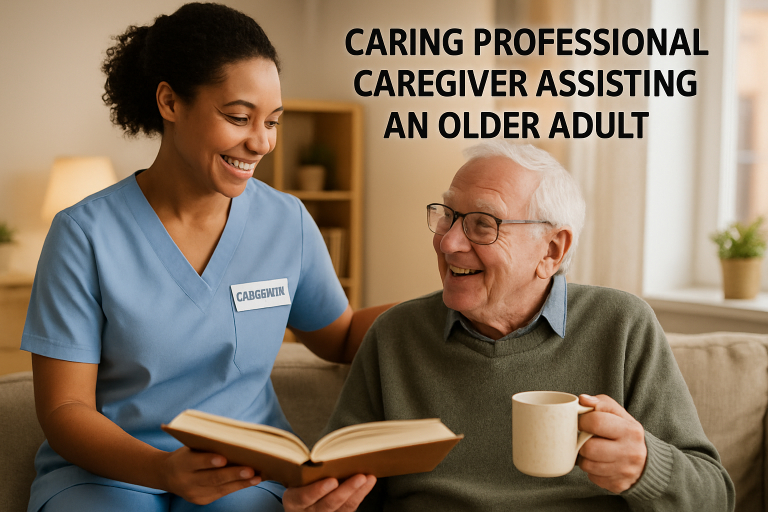How in-home care is shaping healthier, happier lives for aging adults
Key Takeaways
- In-home care offers personalized support, enabling seniors to live safely and independently at home.
- Quality in-home care can boost emotional well-being, promote physical health, and reduce hospital readmission rates.
- Modern in-home care solutions can support families while maintaining dignity and respect for aging adults.
- Emerging technology and caregiver training are enhancing the effectiveness of in-home support services.
Table of Contents
- What Is In-Home Care?
- Benefits of In-Home Care for Older Adults
- How In-Home Care Supports Families
- Promoting Physical and Mental Health at Home
- The Role of Technology in Modern In-Home Care
- Choosing the Right Caregiver: What to Look For
- Overcoming Common Challenges in Home-Based Care
- Looking Ahead: The Evolving Future of In-Home Care
What is in-home care?
In-home care encompasses professional support services, allowing seniors and individuals with chronic health conditions to continue living safely and comfortably in their homes. Services may include help with daily activities, companionship, light housekeeping, meal preparation, and even specialized medical support.
Increasingly, older adults prefer the familiarity and autonomy offered by in-home care, seeking to age in place rather than moving to a care facility. Providers of in-home care for Venice, FL residents are meeting this growing demand by offering tailored care plans delivered with compassion and professionalism.
National trends indicate that more than 70% of adults aged 65 and older will require some form of long-term care, which is now delivered in-home rather than in institutions. With the rise in chronic conditions and an increasing senior population, accessible in-home care has become essential to community health, supporting independence while managing safety and comfort. According to The New York Times reports, in-home care is instrumental in combating social isolation and promoting more vibrant, self-determined lives for older adults.
Benefits of in-home care for older adults
Remaining at home brings emotional comfort and continuity for seniors. Studies show that older adults receiving personalized in-home care report higher life satisfaction, more stable emotional health, and a lower risk of depression than their peers in institutional settings. Maintaining established routines, enjoying cherished surroundings, and continuing meaningful community interactions all contribute to a higher quality of life.
Another crucial benefit of in-home care is minimizing the risk of infections, which are more prevalent in group care settings. This became especially apparent during the COVID-19 pandemic, highlighting the need for safer, more flexible options.
Moreover, in-home care can often lead to fewer hospital readmissions, as care is proactive and adapted to each individual’s health needs. For those with complex or chronic conditions 24 hour live in care provides continuous support ensuring all needs are met around the clock.
How in-home care supports families
While rewarding, family members’ roles as primary caregivers can also be physically and emotionally exhausting. Professional in-home care services provide families crucial respite, reducing caregiver burnout and stress.
According to the AARP Caregiving Resource Center, having reliable external support enables family members to focus on quality interactions, strengthening relationships rather than being consumed by the demands of daily routines. This support system ensures peace of mind, knowing their loved one receives skilled, compassionate care.

Promoting physical and mental health at home
Physical and mental health are deeply interconnected, especially as we age. Quality in-home care incorporates personalized activities to keep both body and mind active. Simple routines such as gentle stretching, daily walks, playing music, and engaging in hobbies foster improved mobility, balance, and cardiovascular health. Creative and social activities—like board games, gardening, or storytelling—build cognitive strength and reduce stress, anxiety, and loneliness. Regular meals shared with a caregiver or daily check-ins can significantly positively affect a senior’s mental outlook.
The role of technology in modern in-home care
Today’s technology is unprecedentedly enhancing home care’s safety and quality. Devices such as wearable fall detection monitors, automated medication dispensers, and voice-activated emergency assistants offer additional protection and convenience. Virtual health consultations allow seniors to access medical advice from the comfort of home, making care more immediate and consistent.
Family members and caregivers increasingly use digital apps to coordinate appointments, track health status, and share real-time updates, thus streamlining communication while empowering more effective, transparent care management. According to The Washington Post, emerging innovations are fundamental in keeping seniors safe and socially connected.

Choosing the right caregiver: what to look for
Finding a caregiver is a deeply personal decision that goes beyond credentials. A trusted home care provider should have thorough training, relevant experience, and a compassionate approach tailored to each senior’s unique needs. Families should ask about background checks, references, and continued education programs to ensure ongoing quality. Equally important are strong communication skills—both with the care recipient and their family—to foster trust and flexibility as needs evolve.
Key Qualities of Exceptional Caregivers
- Respect for autonomy and dignity
- Reliable and timely communication
- Patience and emotional intelligence
- Willingness to collaborate with family and healthcare professionals
Overcoming common challenges in home-based care
Transitioning to home care can pose challenges, from mismatched caregiver-client personalities to changing health needs and managing family dynamics. Open and honest communication, regular care plan evaluations, and a willingness to adjust routines are fundamental to addressing these obstacles.
Periodic check-ins, both formal and informal, help ensure that care remains effective and that the individual’s dignity, preferences, and independence are always prioritized. Engaging all stakeholders in the process—family, caregivers, and healthcare providers—creates a supportive environment for everyone involved.
Looking ahead: The evolving future of in-home care
As global aging trends continue, the demand for in-home care will rise significantly. The future holds promise with the integration of advanced robotics for daily assistance, AI-powered monitoring systems, and enhanced caregiver education. These improvements aim to broaden accessibility, boost efficiency, and promote health and happiness for seniors at home. Continuous innovation—and a steadfast commitment to dignity and well-being—will define the next era of elder care.




